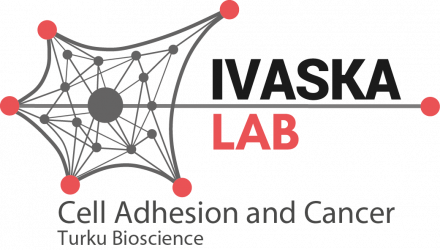Distinct roles of AKT isoforms in regulating β1-integrin activity, migration, and invasion in prostate cancer by Reetta Virtakoivu et al.
Mol Biol Cell. 2012 Sep;23(17):3357-69. doi: 10.1091/mbc.E12-03-0213. Epub 2012 Jul 18.
ABSTRACT
AKT1 and AKT2 kinases have been shown to play opposite roles in breast cancer migration and invasion. In this study, an RNA interference screen for integrin activity inhibitors identified AKT1 as an inhibitor of β1-integrin activity in prostate cancer. Validation experiments investigating all three AKT isoforms demonstrated that, unlike in breast cancer, both AKT1 and AKT2 function as negative regulators of cell migration and invasion in PC3 prostate cancer cells. Down-regulation of AKT1 and AKT2, but not AKT3, induced activation of cell surface β1-integrins and enhanced adhesion, migration, and invasion. Silencing of AKT1 and AKT2 also resulted in increased focal adhesion size. Importantly, the mechanisms involved in integrin activity regulation were distinct for the two AKT isoforms. Silencing of AKT1 relieved feedback suppression of the expression and activity of several receptor tyrosine kinases, including EGFR and MET, with established cross-talk with β1-integrins. Silencing of AKT2, on the other hand, induced up-regulation of the microRNA-200 (miR-200) family, and overexpression of miR-200 was sufficient to induce integrin activity and cell migration in PC3 cells. Taken together, these data define an inhibitory role for both AKT1 and AKT2 in prostate cancer migration and invasion and highlight the cell type-specific actions of AKT kinases in the regulation of cell motility.
PMID:22809628 | PMC:PMC3431929 | DOI:10.1091/mbc.E12-03-0213
